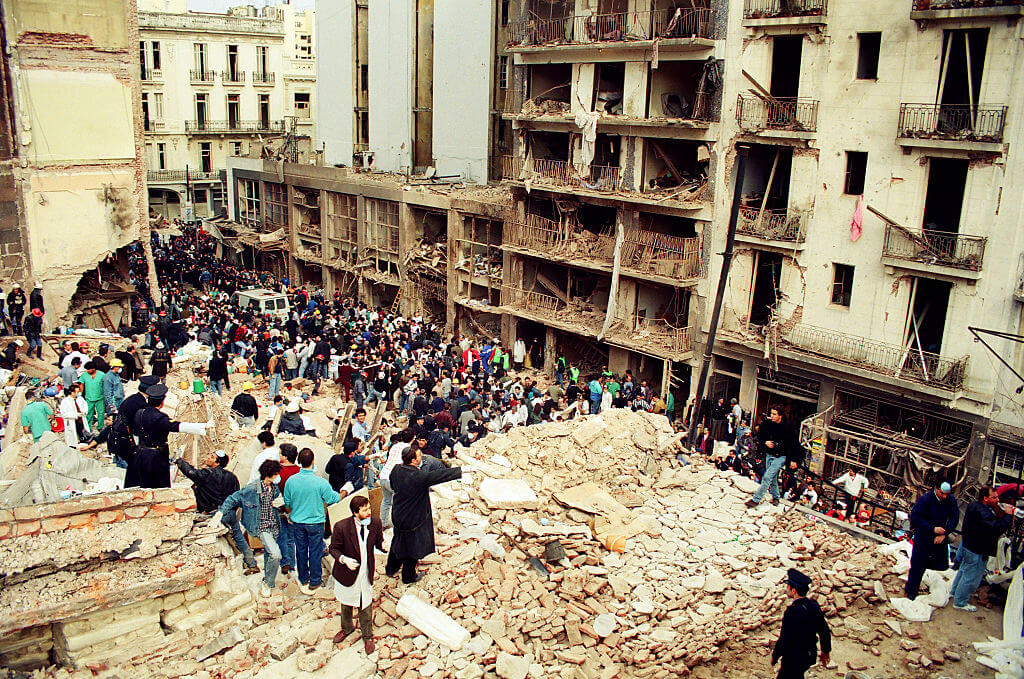False bomb threat hits Buenos Aires Jewish center where 85 people died in 1994 bombing
“Death to the Zionist Jews,” one of the threat emails said

Rescue workers sift through the rubble after the Jewish community center was bombed in Buenos Aires in 1994. Photo by Getty Images
(JTA) — The AMIA Jewish center in Buenos Aires, the site of a 1994 bombing that killed 85 people, was hit with a bomb threat Wednesday.
Law enforcement searched the premises and determined that the threat was a false alarm. The building’s operations continued normally during the search, according to the Buenos Aires Herald.
Emails sent Wednesday from two different users threatened to bomb the AMIA building, as well as DAIA, an umbrella organization representing Argentina’s Jewish community. One of the emails said, “Death to the Zionist Jews,” local media reported.
The bomb threat at the Buenos Aires Jewish community building comes as Jewish institutions around the world face an escalation of violence and bomb threats. In New York alone, 15 synagogues were hit with false bomb threats on Friday, and a Jewish school in Toronto was evacuated last month for a false bomb threat. Multiple Jewish institutions in the Seattle area were sent suspicious packages filled with white powder, which were determined by law enforcement to be non-hazardous.
A previous wave of bomb threats caused synagogues and Jewish institutions across the United States to be evacuated over the summer and fall, continuing even after the arrest of a man in Peru who is charged with making more than 150 hoax threats.
Wednesday morning’s bomb threat is not the first against AMIA since the Israel-Hamas war began in October. On Oct. 19, the building received another bomb threat by email that local police found to be a false alarm.
Bomb threats at Jewish institutions in Buenos Aires, and at AMIA especially, touch a particular nerve in Argentina. The building was the site of the deadliest terror attack in Argentina’s history, in 1994, when a bombing killed 85 people and injured more than 300. The bombing came two years after another bombing killed 20 people at the Israeli embassy in Buenos Aires.
No one has been convicted in the bombings, but Argentina and Israel have long accused Iran and Hezbollah of being behind them. In 2006, Argentine prosecutors Alberto Nisman and Marcelo Martínez Burgos formally accused Iran and Hezbollah of planning and carrying out the AMIA attack. In 2015, Nisman was murdered hours before he was due to testify against former Argentine president Christina Kirchner’s alleged involvement in covering up Iran’s role in the attack.
On Oct. 10, just three days after the Israel-Hamas war broke out, the United States and Israeli embassies in Argentina received emailed threats with the phrase, “Jews, we are going to kill you all.” A man was arrested more than a week later after police tracked him down using the IP address connected to the emails.
Police in Argentina are investigating the emails to determine their origin and find the individual or individuals responsible for Wednesday’s threats.
On Monday, Israel raised its threat level warning for 80 countries, including Argentina, from level one to level two, meaning that Israelis should take caution while traveling there.
This article originally appeared on JTA.org.















